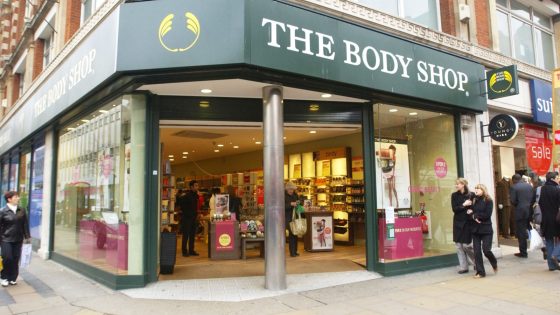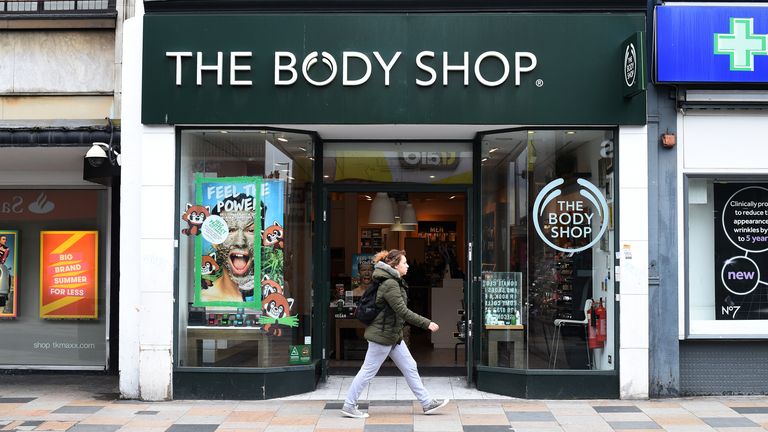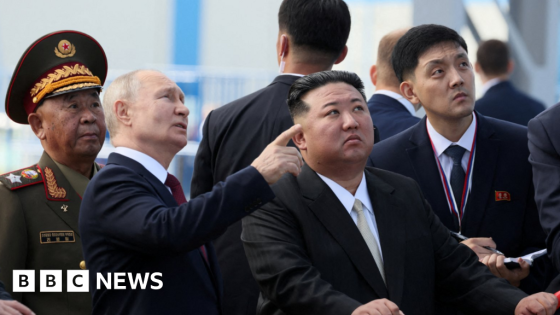The Body Shop’s administrators are to launch an auction of the chain after concluding that an alternative restructuring of one of Britain’s best-known high street retailers was not viable.
Sky News has learnt that FRP Advisory, which has been overseeing the collapsed business since January, is to begin formally sounding out potential buyers in the coming weeks.
The move raises the prospect of new owners taking control of The Body Shop, which was founded nearly half a century ago.
The chain now trades from roughly 100 stores following a shop closure and redundancy programme undertaken in recent months.
Money latest: ‘Seismic shift’ for UK banks as branch milestone is reached
Next expressed an interest in a deal earlier in the insolvency process, while Aurelius, the investment firm which took control of it only weeks before administrators were called in, is also among the possible bidders.
In a statement issued to Sky News, an FRP spokesman said that after engaging with stakeholders about a company voluntary arrangement (CVA), it had “not been possible to reach the necessary agreements for a CVA to be launched”.
“The joint administrators have therefore decided to commence a sale process for the underlying business and assets of TBSI [The Body Shop International].
FRP added that it had been “encouraged by the level of interest received to date from interested parties”.
“The Body Shop remains an iconic brand and following the structural changes we have made to the business since our appointment we consider it has a viable future.
“This will be showcased to potential acquirors during the sale process.”
Sources suggested that FRP expected to clinch a sale of the business during the summer.
The insolvency practitioner had informed creditors of the potential auction in a progress report issued several weeks ago.
“In the event that a CVA cannot be agreed, the joint administrators will proceed with a sale of the business and assets,” FRP said in March.
The Body Shop’s collapse into administration in February underlined the decline of a high street stalwart founded by the late Dame Anita Roddick and her husband Gordon almost half a century ago.
Aurelius bought the chain from Natura & Co, a Brazilian company which was reported to have paid more than $1bn to buy it in 2017.
According to the administrators’ report, Aurelius was confronted immediately after taking ownership of the chain with a “short-term cash position [which] was adverse to that that had been forecast, driven by poor results in the 2023 financial year and the unwinding of the company’s working capital”.
“Prior to the sale to the Aurelius Group, stock levels were depleted over the peak Christmas trading period.”
Aurelius is understood to have continued financing the business during the administration process.
The Body Shop’s businesses across most of Europe and parts of Asia had already been offloaded to a family office prior to the insolvency of the UK arm.
Read more:
The Body Shop UK in administration. What went wrong?
At the time of the sale to Aurelius, The Body Shop employed about 10,000 people, and operates roughly 3,000 stores in 70 countries.
Although it has struggled for profitable growth for years, it has retained a prominent presence on British high streets.
The Roddicks were prominent champions of environmental causes, a positioning which helped it gain an edge over rival retailers during the 1980s and ’90s.
Its opposition to the animal testing of cosmetics was also unusual in the decades immediately after it was founded.
Its distinctiveness has, however, been diminished in recent years by the emergence of competitors which also put sustainability at the heart of their businesses.
The Body Shop was owned by L’Oreal, the cosmetics giant, prior to its sale to Natura.
Source Agencies




